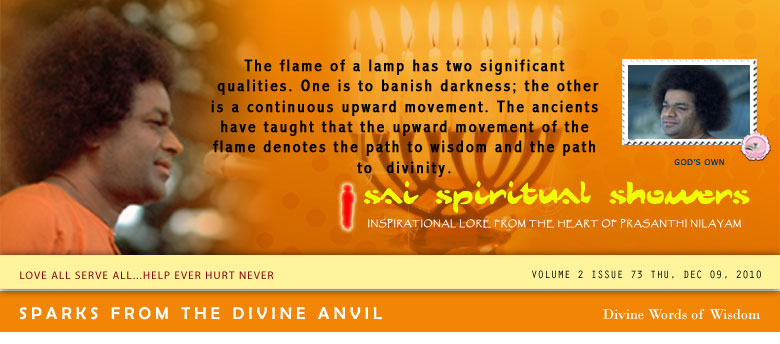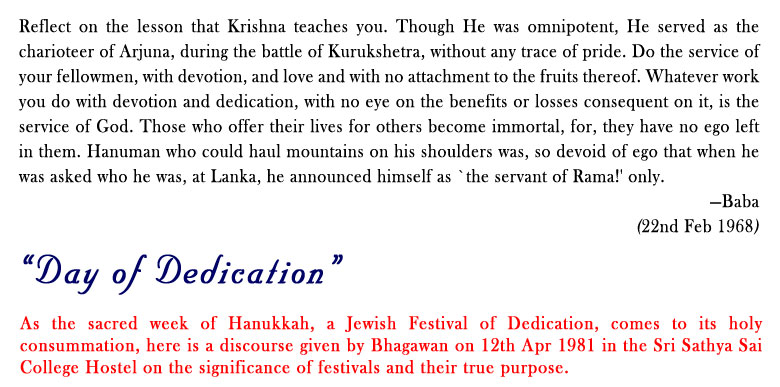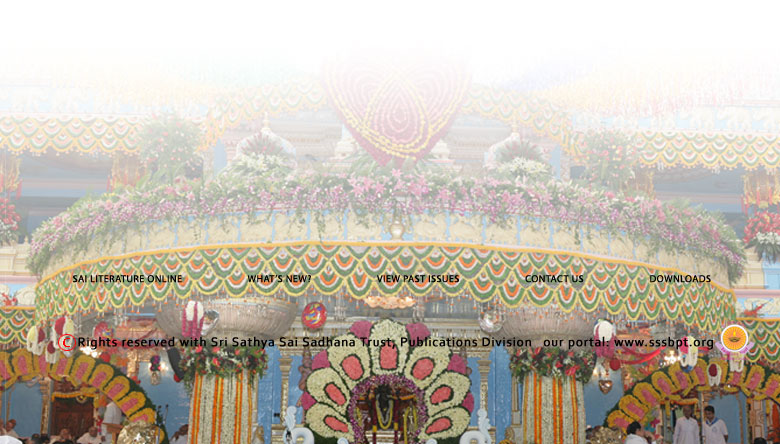 |
 |
Days that are marked out as festivals in the calendars of all races and religions are significant because they have a deep spiritual meaning. They have to be used by man for examining habits and practices, prejudices, and partialities and for cleansing the mind of these. The attitudes and guidelines that are clogging progress have to be discarded and fresh fruitful ones welcomed. The days have to be dedicated for trimming the old and planting the new. How is a holy festival day celebrated now? Immediately after dawn, people take a bath and wear new clothes or fresh washed clothes. The house and the space around it are swept clean; the walls are whitewashed; the furniture is dusted; the cobwebs are swept off. Festoons of green are strung over the doors. We find joy and laughter on every face. All partake together a feast, prepared with love and care. The past is forgotten; the present is filled with happiness; tomorrow is not allowed to cast its shadow on today. Hope, faith and enthusiasm fill the air. All this is certainly good. But there is more in a festival than these ostensibles. Behind the seen, there is a sublime unseen. The seen and the unseen are two halves of the One, or rather, two phases of the One. From the Full, the Full has emerged, leaving the Full ever Full. The Created is as full of the One as the One whose manifestation it is. The Experiencer is as Full as the Experienced. A grain of sand is as full as a star in the sky. The Paramatma, who is the One Fullness, has willed mankind, which is co sharer of that Fullness. Man has to fulfill himself, half by his individual effort and half through the Grace of the indwelling Divine. Awareness of this Fullness, escaping from the illusion of incompleteness, is the goal, the destination of human life. When man knows, visualises and experiences the Creator, he becomes as mighty, as majestic and as knowledgeable as the Creator. The ultimate cause cannot be the object of direct vision, nor can it be discovered by logical inference. One has to rely on the Word, the Sabda, the Vedas, and proceed along the path laid down therein. Success in this Sadhana depends on self-control and sense control. Even for the successful execution of daily routine chores we find that these controls are very beneficial. Why? Birds and beasts, insects and worms suffer much when they allow their acts and movements to be guided by the senses. Many have learnt to check the fatal tendency to obey every whim or to pursue every thing that attracts. Discrimination has developed through necessity for survival in most living beings but, in man, it has become a highly developed skill. Man has to use this skill to separate the chaff from the grain and decide on the constructive path of truth and righteousness. Meditation is now practised and propagated in a very new fangled manner. Without cleansing the mind of its evil thoughts and low desires, how can one use it to win good results? Food cooked in unclean vessels is not fit to be eaten. The prime need for progress in Sadhana is a pure mind, rid of evil thoughts and feelings. Work is purified by the attitude of worship. Dedicate all your activity to God. Then, it will not be warped and worsened by the ego. Satsang, such as you can have in the Hostel, will be of great help. Each one of you must hold on to the discipline that can keep you straight. No one anywhere else has such congenial opportunities and such constant encouragement. |
 |
